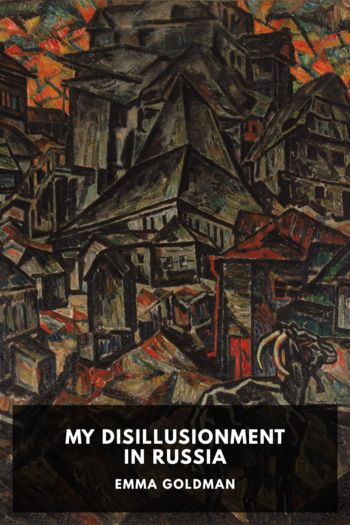My Disillusionment in Russia Emma Goldman (the beginning after the end read novel TXT) 📖

- Author: Emma Goldman
Book online «My Disillusionment in Russia Emma Goldman (the beginning after the end read novel TXT) 📖». Author Emma Goldman
I decided to try other methods. I would talk to the employees in the departments about the vital interest the conscious American workers felt in the great Russian Revolution, and of their faith and hope in the Russian proletariat. The people would become interested immediately, but the questions they would ask were as strange as they were pitiful: “Have the people enough to eat in America? How soon will the Revolution be there? Why did you come to starving Russia?” They were eager for information and news, these mentally and physically starved people, cut off by the barbarous blockade from all touch with the western world. Things American were something wonderful to them. A piece of chocolate or a cracker were unheard-of dainties—they proved the key to everybody’s heart.
Within two weeks I succeeded in procuring most of the things needed for the expected deportees, including furniture, linen, and dishes. A miracle, everybody said.
However, the renovation of the houses that were to serve as living quarters for the exiles was not accomplished so easily. I inspected what, as I was told, had once been first-class hotels. I found them located in the former prostitute district; cheap dives they were, until the Bolsheviki closed all brothels. They were germ-eaten, ill-smelling, and filthy. It was no small problem to turn those dark holes into a fit habitation within two weeks. A coat of paint was a luxury not to be thought of. There was nothing else to do but to strip the rooms of furniture and draperies, and have them thoroughly cleaned and disinfected.
One morning a group of forlorn-looking creatures, in charge of two militiamen, were brought to my temporary office. They came to work, I was informed. The group consisted of a one-armed old man, a consumptive woman, and eight boys and girls, mere children, pale, starved, and in rags. “Where do these unfortunates come from?” I inquired. “They are speculators,” one of the militiamen replied; “we rounded them up on the market.” The prisoners began to weep. They were no speculators, they protested; they were starving, they had received no bread in two days. They were compelled to go out to the market to sell matches or thread to secure a little bread. In the midst of this scene the old man fainted from exhaustion, demonstrating better than words that he had speculated only in hunger. I had seen such “speculators” before, driven in groups through the streets of Moscow and Petrograd by convoys with loaded guns pointed at the backs of the prisoners.
I could not think of having the work done by these starved creatures. But the militiamen insisted that they would not let them go; they had orders to make them work. I called up Kaplun and informed him that I considered it out of the question to have quarters for American deportees prepared by Russian convicts whose only crime was hunger. Thereupon Kaplun ordered the group set free and consented that I give them of the bread sent for the workers’ rations. But a valuable day was lost.
The next morning a group of boys and girls came singing along the Nevski Prospekt. They were kursanti from the Tauride Palace who were sent to my office to work. On my first visit to the palace I had been shown the quarters of the kursanti, the students of the Bolshevik academy. They were mostly village boys and girls housed, fed, clothed, and educated by the Government, later to be placed in responsible positions in the Soviet regime. At the time I was impressed by the institutions, but by April I had looked somewhat beneath the surface. I recalled what a young woman, a Communist, had told me in Moscow about these students. “They are the special caste now being reared in Russia,” she had said. “Like the church which maintains and educates its religious priesthood, our Government trains a military and civic priesthood. They are a favoured lot.” I had more than one occasion to convince myself of the truth of it. The kursanti were being given every advantage and many special privileges. They knew their importance and they behaved accordingly.
Their first demand when they came to me was for the extra rations of bread they had been promised. This demand satisfied, they stood about and seemed to have no idea of work. It was evident that whatever else the kursanti might be taught, it was not to labour. But, then, few people in Russia know how to work. The situation looked hopeless. Only ten days remained till the arrival of the deportees, and the “hotels” assigned for their use were still in as uninhabitable a condition as before. It was no use to threaten with the Cheka, as my co-workers did. I appealed to the boys and girls in the spirit of the American deportees who were about to arrive in Russia full of enthusiasm for the Revolution and eager to join in the great work of reconstruction. The kursanti were the pampered charges of the Government, but they were not long from the villages, and they had had no time to become corrupt. My appeal was effective. They took up the work with a will, and at the end of ten days the three famous hotels were ready as far as willingness to work and hot water without soap could make them. We were very proud of our achievement and we eagerly awaited the arrival of the deportees.
At last they came, but to our great surprise they proved to be no deportees at all. They were Russian war prisoners from Germany. The misunderstanding was due to the blunder of some official in





Comments (0)